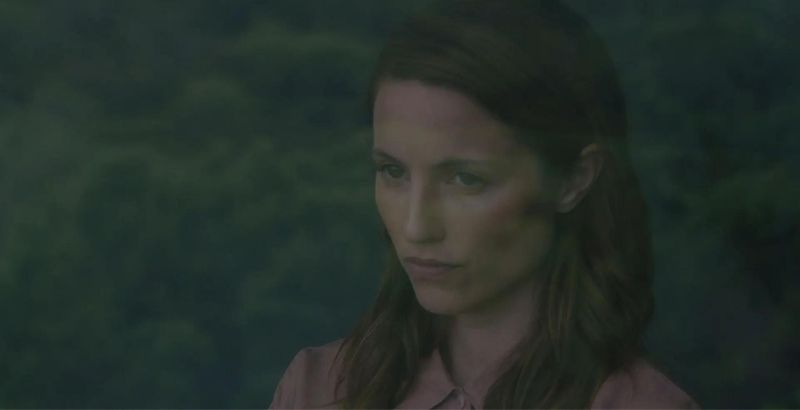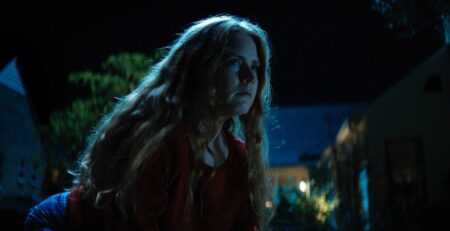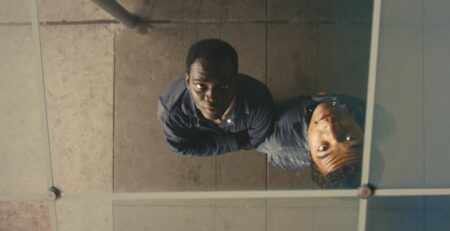
Maternal horror scares me like nothing else out there because I hate the idea of giving birth. Now in my 30s and on the other side of a bilateral salpingectomy (removal of both fallopian tubes), I look back on the time I spent feeling like I was broken and bringing shame to my family by not wanting children and want to console that past version of me. There is nothing like the weight of feeling broken for simply wanting a different life than those around you. Hulu’s Original film Clock directly confronts this and explores how women are forced to “fix” themselves by forcing themselves into motherhood.
Written and directed by Alexis Jacknow, Clock is the story of Ella (Dianna Agron), who enrolls in a clinical trial to try and fix her broken biological clock. When her friends, family, and society pressure her to have children, she caves to the view that something in her is broken instead of being at ease with her decision. In the words of those around her, women want to be mothers, and you’re broken if you don’t. Clock is anything but subtle in its approach to maternal horror; sometimes, that’s great, and at others, it falters.
With two white women as the focus, it’s interesting to see that maternal mortality isn’t mentioned. Given that Black and Latina women are incredibly more at risk than white women to die during and after childbirth, Dr. Simmons’ (Melora Hardin) nonchalant attitude when trying to convince Ella to embrace birthing there is a dismissal of maternal pain by saying that there are meds to help with the pain. This only works because Ella is a white woman, but that doesn’t detach me from the film. No, instead, it pulls me in. As I watched Clock, I found myself internally screaming that Ella was right, Dr. Simmons was wrong, and that it’s okay to be scared of birth because of my knowledge of maternal mortality and personal fear of childbirth.
While Clock tries to add complexity to the decision not to have children, it doesn’t engage it in a way that unpacks the physical ramifications of birthing on the body or its history. Which makes me ask, why bring it up at all? Because Ella’s reasoning for not wanting kids, while only clear in small bursts, is in direct conflict with her Jewish identity, and that is where the film’s critique of motherhood as something forced for and by family is the strongest.
Ella feels immense guilt for not wanting to have children because of her family surviving the Holocaust and her father’s guilt trips about letting their heritage die. For me, it was something similar. When eugenics-based sterilization was outlawed in the United States in the 1920s, it saved disabled white women from forced sterilization. It didn’t save Latinas who were surgically sterilized in immigration detention camps as recently as 2014. Because so many women in my community were robbed of their ability to give birth, I inherently carried that guilt with me. And like Ella, coming to terms with my place in a larger cultural history and my needs was difficult.
What Clock does extraordinarily well is capturing the complexity of deciding not to have children. Yes, it should be as simple as “I don’t want kids,” but in practice, we must guard our choice with reasons and contend with pushback. By giving those external pressures a biomedical nightmare shape, the film expertly captures how it all culminates in our lived experiences. From creating cerebral presentations of Ella’s fear of giving birth and ultimately fixing her clock to how sterile and invasive annual visits are, Clock captures anything associated with motherhood and health as horrors. For many, that’s what they are.
For her part, Dianna Agron is stunning as Ella. As Ella’s confidence and love of her kid-free life begins to wane, and a vulnerable mess of a woman emerges, audiences get to see Agron’s range as an actress. Her often even-toned voice changes as she explores herself and finds new things to hate as she moves to crave a baby. And unsettling performance by the film’s end, Agron is at her best here.
Despite my connection to much of what Ella is feeling through the film, the pacing in the film’s back half leaves a bit to be desired, shifting from medical and maternal horror into a psychosis fit with jump scares. While I’m not in love with the descent on-screen, the fact that the horror is pushed by Ella’s choice to cave into the world, forcing her to motherhood, is a much-needed look at it. It’s Ella’s breaking to the pressure of living up to other people’s assumptions that cause the horror, and not choosing herself causes her fall. And that’s a takeaway I want to see more from, even if how we get to this point isn’t the cleanest.
At its best when it is engaging in actual commentary on motherhood and less when it tries to make you jump, Clock thoughtfully adds to the maternal horror subgenre. Motherhood shouldn’t be forced on anyone, and when it is, the horrorshow starts; I only wish Clock unpacked the “why” in all its explorations.
Clock is streaming exclusively on Hulu now.
Clock
-
Rating - 8/108/10
TL;DR
At its best when it is engaging in actual commentary on motherhood and less when it tries to make you jump, Clock adds to the maternal horror subgenre thoughtfully. Motherhood shouldn’t be forced on anyone, and when it is, the horrorshow starts; I only wish Clock unpacked the “why” in all its explorations.




